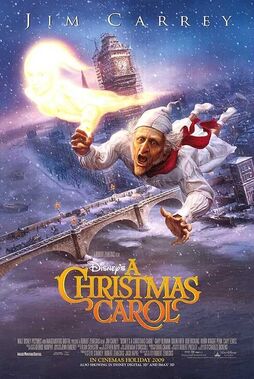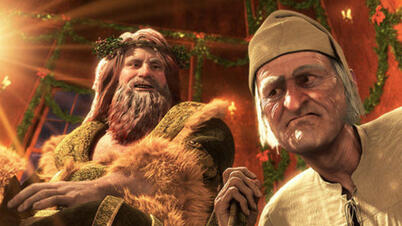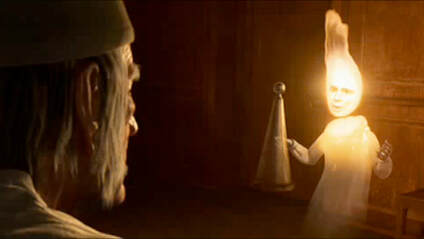
https://christiananswers.net/spotlight/movies/2009/christmascarol2009.html
Fred (Colin Firth): “There are many things from which I have derived good and have not profited. Christmas being among them. But I have always thought of Christmas as a kind, charitable time. The only time when men open their shut-up hearts and think of all people as fellow travellers to the grave and not some other race of creatures bound on other journeys. And therefore, Uncle, although it has never put a scrap of gold or silver in my pocket, I believe it has done me good, and I say, God bless it!”
In February of 1978, famed music journalist Greil Marcus described Al Green’s The Belle Album as carrying “a sense of liberation and purpose deep enough to make the sinner envy the saved”. Forty-two years on, Marcus puts into words so eloquently, the exact way I feel towards 2009’s A Christmas Carol. This visually striking adaptation of the Charles Dickens literary classic is by no means perfect and was met with only faint praise upon its release. Yet, I have always found there to be something so undeniably true in Ebenezer Scrooge’s ‘conversion’ story, albeit an ostensibly secular one, that I have been drawn back to it annually from the moment I first laid my eyes upon it. Yes, this is a tale comprised of motifs which feel as old as time itself, but regardless of however many adaptations we might see of it, or how many times I watch it with my family, this rendition will forever remind me of the spiritual encounter I had and continue to have, with the living God.
Throughout the film, we watch as the Ghosts of Christmas lead him to revisit the most painful, regrettable moments of his life – from idolising money over loving his fiancé as he should, to hardening his heart in the face of the poor and needy, who require aid. It’s a process throughout which I found myself strangely mourning for him, regardless of whether he was embittered by the hand that life dealt him, or simply chose to be and was therefore unable to see what he had become. What remained clear to me throughout, however, is that we too are able to call to mind a series of events which we regret, just as Scrooge does. For human fallibility is unavoidable, as the Apostle Paul teaches: “all have sinned and fall short of the glory of God” (Romans 3:23, NRSV). The Bible teaches that humankind’s inherent nature is to rebel against God and make mistakes (deliberately or otherwise), witnessed in the Garden of Eden and beyond. In fact, as Scrooge trudges through the cold, harsh streets, we see that he is completely unaware of the pain he is causing those around him, which reminded of a Psalm of David: “But who can detect their errors? Clear me from hidden faults.” (Psalm 19:12, NRSV). Before coming to Christ, the Bible teaches that we are blind to every single one of our sins, and are, in almost all cases, content to be so. But the sins we commit also form a blockage between us and our Creator, preventing us from seeing Him, receiving His gift of friendship and eternal salvation.
Intriguingly, however, this adaptation drives home the crushing reality of sin. Like the Bible teaches, the film posits that Scrooge is in dire need of liberation from the invisible chains of sin which so often bind us and lead to hell. For if he doesn’t change, Scrooge will receive “…the wages of sin (which are) death” (Romans 6:23, NIV), and he will not only experience physical death therefore, but a spiritual one too. So, his one chance of receiving salvation comes in the form of a visitor from beyond the grave - a former business partner named Jacob Marley, who warns him that he now “wears the chains he forged in life” and are symbolic of his sin. The length and weight of Scrooge’s chains are left ambiguous, but I believe it to have been a conscious decision on the part of Dickens, in order to illustrate that his own is, frighteningly, longer and far weightier than his former partner’s.
And so, Marley’s introduction sequence shocks me into looking back upon my life to ask, have I actually spent it well? It’s even led me to wonder if am in fact a ‘good’ person. As if God hadn’t already given me enough to consider, Jacob Marley also takes a moment to furiously lament the misuse of the gift which was his life. “I was blind! Blind! I could not see my own life, squandered and misused! Oh, woe… OH, WOE IS ME!” he wails. Knowing that separation from God for eternity is biblically described as the punishment for sin, this moment helped imagined for me what it must be like now for the deceased who, like me, were once tragically and blissfully unaware of their impending fate. Eternal death and hell became a reality for me whilst watching that very sequence. For Marley’s speech indicates that hell is “a place of suffering”, where its guilty inhabitants are sentenced to be “separated from God’s mercy and blessing” and instead receive a fate that is “final and fixed” (Rico Tice, Honest Evangelism: How to Talk About Jesus Even When It’s Tough, Pg. 36-37). Jesus affirms this when He taught in the book of Luke that between Him and the guilty, “a great chasm has been fixed” and therefore “no one can cross from there to us” (Luke 16:26, NRSV).
Understandably, Marley’s harsh warning left Scrooge and I feeling visibly shaken. And as if that wasn’t enough to persuade him to change his ways, the story introduces Scrooge to the first of three more spirits who appears curiously in the form of a candle, possessing a star for a flame and a cap to extinguish its light. Upon his arrival, the room is instantly illuminated, as the being’s “crown sprung a bright clear jet of light”. Blinded by or perhaps fearful of the light, Scrooge begs him to be covered, to which the ghost asks, “would you so soon put out, with worldly hands, the light I give?” It’s almost impossible not to be reminded of Jesus in these moments, especially when the ghost informs him that he is there for Scrooge’s “reclamation”. For an element of Jesus’ God-given purpose is to illuminate the darkness that lives within us - those who are oblivious or ignorant to the perfect light which He gives. In 1 John, the author argues that for us to claim that we are in friendship “with Him while we are walking in darkness, we lie and do not do what is true” (1 John 1:6, NRSV). No, in order for you and me to be a friend and disciple of God, our inherent brokenness must be addressed. The truth has to be brought to His perfect light, one which is naturally intense and beyond comparison. It could very well blind us, but just as Scrooge nervously chooses to embrace the light and his invitation to examine his life, warts-and-all, I too made that decision. For Scrooge, the spirit offers his hand towards him as a friend would and so too does Christ.
In receiving it, Scrooge is treated to a literal, “heavenly perspective of man’s world” - one “not many mortals are granted”. But it is also figurative, in the the sense he has been given an unlikely opportunity to have the error of his ways revealed and avoid the same fate as his business partner. And God, through the work of His Son Jesus Christ, offers that opportunity to us today. In spite of our ignorance, God implores us to acknowledge our sin for what it is and to turn from it, made possible by sending His Son to pay the price which humanity owed, when He gave His life for us on the Cross. He was brutally crucified on the cross as the “…offering for our sin”, so “that we could be made right with God through Christ” (2 Corinthians 5:21, NLT), and avoid eternal death.
In accepting that we are flawed and in need of salvation isn’t easy but doing so not only saved me from a hellish eternal existence and opened me up to the possibility that I could be better than the worst offence I have ever committed. Through doing so, Scrooge’s entire outlook on life was forever changed and so was mine. Suddenly, Scrooge didn’t want to ignore the needy or misuse his power (much to the confusion of society). And whilst Scrooge’s story is a work of fiction, to God, such a process is entirely possible. For Him, if we accept Christ into our lives and turn from our sin, we “are a new creation” whose old lives have “passed away” and “become new”, as it written in 2 Corinthians 5:17 (NRSV). It is now impossible to watch A Christmas Carol without shedding tears of joy alongside Scrooge, which in turn propels me to share of my liberation from the chains of sin and encourage more non-Christians to experience this film, so that they too might envy the saved just as I did.
Challenge:
Why not prayerfully invite a friend or family member who doesn’t yet know Jesus, to watch Disney’s A Christmas Carol for themselves? Use the film’s themes to ask them what they thought of the film, if they spotted any links to Christianity and what they might think of the Gospel’s response to this subject.
If you feel able to, ask them what they think about the film’s understanding of what it means to be good – can someone as evil as Scrooge truly change their ways, or is the film just full of wishful thinking? Ask them whether they consider Scrooge’s actions to as bad as the film does – does he deserve to be as unhappy as Marley after death? Or do they think that even he deserves a second chance?
Prompt them to consider Scrooge’s wrongdoing and how Marley says it will weigh upon him more heavily in eternity – do they think that they are perhaps forming a chain in their life today? Go on to breach the subject of salvation, saying that God, through the sacrifice of Jesus, showed His love for us for us and that he didn’t want anyone to live apart from Him in hell, for eternity. Instead, God is “not wanting any to perish, but all to come to repentance”, so that they might enter into relationship with Him. Share that 2 Peter 3:9 verse with them and take the opportunity to share the hope of the Gospel message with them – they even they, who are just as bad as Scrooge in God’s eyes, can be saved. Then, invite them (if you feel prompted to by God) to consider accepting Jesus into their life today.
Prior to watching the film for yourself, however, take a moment to pray that God would speak to you through the film. If you feel comfortable, pray this prayer over all of your future, film-watching experiences:
Dear Lord, as I watch this film, I ask that you would be present here with me. Highlight to me anything within it that is honourable, anything that can be used in conversation for your Kingdom purposes. Amen.
Disney’s A Christmas Carol is now available to stream through Disney+.



 RSS Feed
RSS Feed